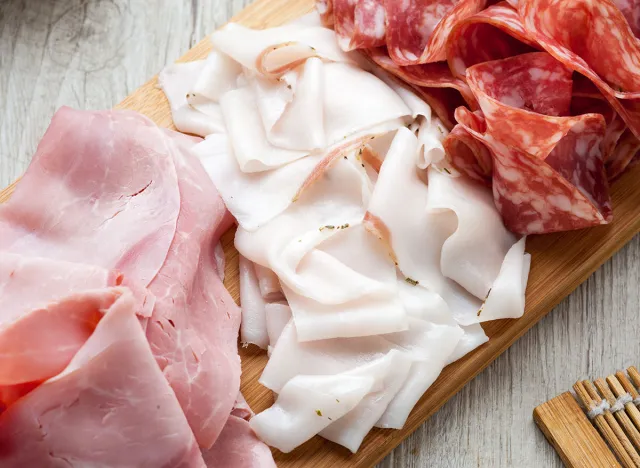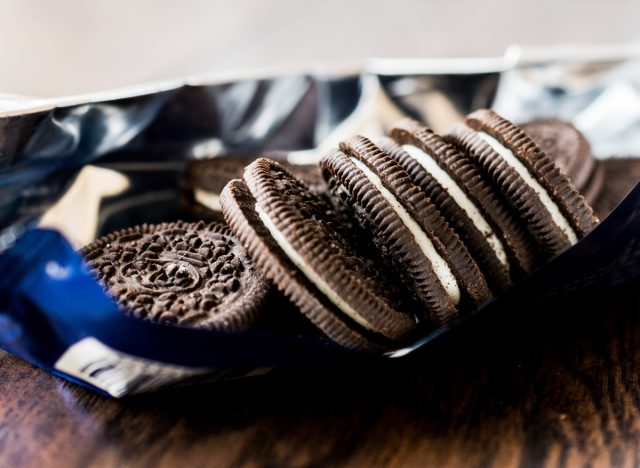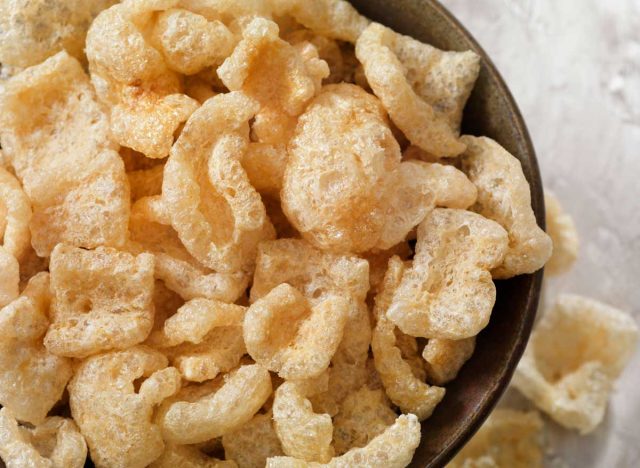Pork rinds are a popular snack, especially among those following low-carb or keto diets. Their crispy, crunchy texture and savory flavor make them hard to resist. But some people report feeling bloated and uncomfortable after eating pork rinds. So do these snacks really cause bloating? Let’s take a closer look.
What Are Pork Rinds?
Pork rinds also called pork skins or chicharrones are made from pig skin that has been fried or roasted until puffy and crispy. The fat beneath the skin renders out during cooking, leaving behind a crunchy snack that is low in carbohydrates yet high in fat and protein.
Pork rinds have been enjoyed for centuries across many cultures. Low-carb and keto dieters use them instead of high-carb snacks like chips, crackers, and pretzels, which is a big reason for their recent rise in popularity.
Why Do People Enjoy Eating Pork Rinds?
There are several reasons pork rinds have become a go-to snack for many:
-
Low in carbs, high in protein: With 0g net carbs and anywhere from 13-17g protein per serving, pork rinds make a nutritious choice for low-carb lifestyles. The protein keeps you feeling full and satisfied.
-
Naturally gluten-free Pork rinds are a crunchy, savory gluten-free option This makes them appealing to those with celiac disease or gluten intolerance
-
Contain healthy fats: While high in total fat, around 43% of the fat in pork rinds is oleic acid – the same heart-healthy monounsaturated fat found in olive oil.
-
Crunchy and tasty: Pork rinds are hard to resist as a snack because they are crispy and crunchy and taste salty and savory.
What Ingredients Are in Pork Rinds?
There are just two main ingredients in basic pork rinds:
-
Pork skin: The base of the pork rind is pig skin that has been fried or roasted.
-
Salt: Salt is added to pork rinds to amplify their savory flavor. Some brands may use other seasonings as well.
However, there are also some potentially concerning ingredients found in certain pork rind brands:
-
Preservatives and flavor enhancers: Ingredients like MSG, nitrites, and artificial flavors are added to some mass-produced pork rinds to boost flavor.
-
Trans fats: Cheaper hydrogenated oils used for frying in some factories may introduce unhealthy trans fats.
-
High sodium: Many brands of pork rinds are extremely high in sodium, with over 500mg per serving.
When choosing pork rinds, read labels and look for options without unnecessary additives and lower in sodium. Or better yet, make your own!
Can Eating Pork Rinds Cause Bloating?
Now let’s get to the bottom of the bloating issue. Yes, pork rinds may cause bloating in some people when eaten in large amounts. There are a few reasons why:
-
High sodium content: With over 20% of the daily recommended sodium in just one ounce, too many pork rinds can lead to water retention and bloating.
-
Fat content: The high fat content of pork rinds could result in indigestion, gas, and bloating when over-consumed.
-
Fried food: Anything fried can be harder to digest and prone to cause stomach discomfort. The oil used to fry pork rinds may be to blame.
-
Allergies: It’s possible to have an undiagnosed allergy or intolerance to an ingredient in pork rinds, like pork itself or added seasonings.
-
Processed food: Heavily processed snack foods like pork rinds are linked to digestive issues. Their lack of fiber and nutrients also starve healthy gut bacteria.
Tips to Prevent Bloating from Pork Rinds
If you enjoy pork rinds as an occasional snack, here are some tips to eat them in a gut-friendly way:
-
Watch portions: Stick to reasonable serving sizes around 1 ounce, and avoid overdoing it.
-
Read labels: Select low-sodium varieties without additives like MSG. Or better yet, make your own!
-
Choose healthier oils: Opt for pork rinds fried in avocado oil or olive oil instead of vegetable oils.
-
Slow down: Eat them slowly and chew thoroughly to aid digestion. Don’t inhale the whole bag at once!
-
Stay hydrated: Drink plenty of water before, during, and after eating to counteract sodium intake.
-
Listen to your body: If you experience bloating or discomfort after eating pork rinds, they may not agree with you.
Healthy Snack Alternatives to Pork Rinds
If you find pork rinds consistently cause unpleasant symptoms, there are many other satisfying low-carb snacks you can enjoy instead:
- Baked cheese crisps
- Roasted nuts
- Nut and seed trail mixes
- Vegetable chips made from low-carb veggies
- Guacamole and veggies
- Hard-boiled eggs
- Greek yogurt with nut butter
- Turkey or ham roll-ups
- Chia pudding
While pork rinds can be an occasional part of a healthy low-carb or keto diet, they aren’t for everyone. Pay attention to how your body responds and limit them if they cause persistent digestive distress. With so many nutritious and delicious snack options out there, you don’t have to force yourself to eat pork rinds if they make you feel crummy.
The Bottom Line
Because of their high sodium, fat, and fried preparation, pork rinds may cause bloating, especially when consumed in large quantities. Those with food intolerances may also react poorly. Enjoy pork rinds sparingly as part of a balanced diet, and opt for healthier snacks if they consistently make you feel gassy or bloated. With a little self-awareness and moderation, pork rinds can be a gut-friendly occasional treat.

Deli ham or turkey

You may want to add other processed deli meats to your list of snacks to avoid as well. “One food to watch out for when it comes to maintaining a healthy digestive system is lunch meat, like deli ham or turkey,” says Kristin Draayer, MS, RDN. “Research has shown that these processed meats can increase the risk of both bowel and stomach cancers.”6254a4d1642c605c54bf1cab17d50f1e
But if you really want a tasty turkey or ham sandwich, you don’t have to give up this quick and easy meal. “Its a good idea to try to enjoy them less frequently and in smaller portions,” Draayer says.

To make cookies that are better for you, you can use whole wheat flour, mash a banana or avocado into the mix to make the batter softer, or add a cup of high-fiber oats. But most store-bought cookies dont employ any of these healthier baking techniques. Instead, they rely on refined grains, sugars, and preservatives to create a sweet finished product.
All this processing isnt a route to smoother digestion. “There is a growing body of research to show that consuming a diet high in ultra-processed foods can have negative effects on gut health,” says food scientist and dietitian Dr. Shyamala “Shy” Vishnumohan, PhD.
This doesn’t mean you should never have store-bought cookies as a treat in the afternoon or after dinner, but Vishnuomohan suggests you think about how often you eat them. Do not be afraid of a certain food. Instead, look at how many ultra-processed foods you eat every day. This is a good place to start with re-assessing your diet. “.

As fried foods, pork rinds wont make any lists of good-for-you snacks. Because they were ultra-processed, don’t have any fiber, and are high in fat, these crispy bites are not good for your gut at all. In fact, a study done on animals in 2021 showed that pork fat changed the microbiome in a big way and was bad for intestinal health. For a better crunchy choice, consider veggie chips or lightly salted nuts.

Snack cakes are another epitome of ultra-processing, containing high amounts of sugar, fat, preservatives, and artificial flavors and colors. According to Melissa Hooper, MS, RDN, founder of Bite-Size Nutrition, foods like these can wreak havoc on gut health.
“It is well known that sugar can make inflammation worse, which can change the microbiome in the gut and hurt the gut lining, which can remove good bacteria,” she says.

“Soda has been known as a poor food choice for quite some time, however, it can be particularly bad for gut health too,” says Kimberley Wiemann, MS, RDN. According to Wiemann, sodas added sugars can pull extra water into your digestive tract, leaving you with side effects like diarrhea, while the caffeine in some soft drinks can also make digestion undesirably speedy. “Diet sodas may be even worse for gut health because the artificial sweeteners can disrupt the healthy bacteria in your gut,” she says.
Sign up for our newsletter! This site is protected by reCAPTCHA and the Google
Is this content interesting for you? Join our FREE Daily Newsletter
This site is protected by reCAPTCHA and the Google
Now, youll have the best and latest food and healthy eating news right in your inbox—every single day
Dr. Westman Reviews: Pork Rinds vs Veggie Chips
Are pork rinds bad for You?
Pork rinds are high in both saturated fat and cholesterol, an unhealthy combination that can raise your low-density lipoprotein (LDL) levels — the “bad” kind of cholesterol. If you eat pork rinds, here are some things to consider: Look for brands that don’t contain artificial preservatives and flavorings and that are lower in sodium.
Why is pork not recommended to eat?
This is not true, some cuts like sirloin and pork rump steak, for example, are very healthy, even healthier than beef and chicken. Only the fattest cuts like bacon and crackling should be avoided.
Can you eat pork rinds?
If you want to include pork rinds in your diet, it’s best to eat them in moderation. Instead of snacking on them out of the bag, try using them as a crunchy, bacon-like topping on roasted vegetables or a salad. That way, you can enjoy their flavor but keep your calorie and sodium intake to a minimum.
Are pork rinds high in saturated fat?
The two main types of saturated fat in pork rinds are stearic acid and palmitic acid. Studies on stearic acid have found it to have a neutral effect on cholesterol levels.
